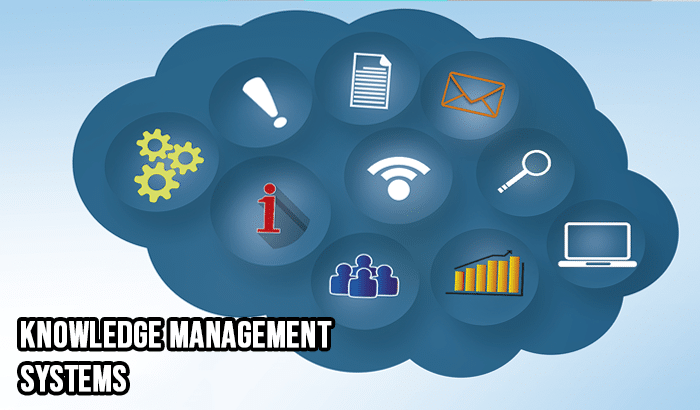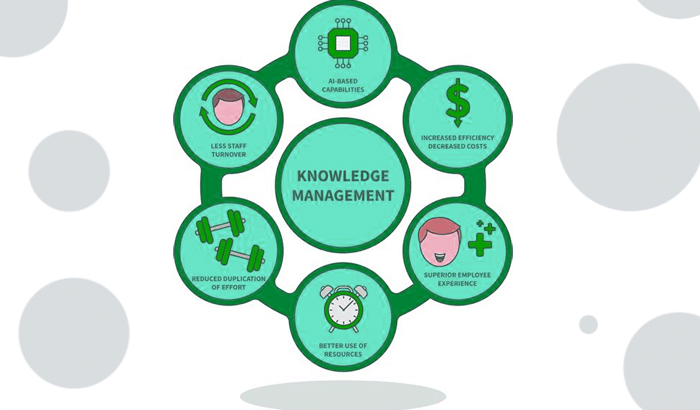Knowledge management systems play a vital role in modern organizations by facilitating the efficient capture, storage, organization, and retrieval of information.
With numerous options available in the market, choosing the right knowledge management system for your business can be a daunting task.
In this article, we will explore the top 10 best knowledge management systems that can enhance productivity, streamline workflows, and foster collaboration within your organization. So, let’s dive in and discover the best tools that can help you manage your knowledge effectively.
In today’s fast-paced business environment, organizations are constantly seeking ways to maximize productivity, foster innovation, and enhance collaboration among their employees.
Knowledge management systems provide a solution by offering a centralized platform to capture, organize, and distribute knowledge across the organization. These systems enable companies to leverage their collective knowledge, improve decision-making processes, and drive overall efficiency.
Daftar Isi :
What is a Knowledge Management System?
A knowledge management system is a software platform or tool that helps organizations capture, store, organize, and retrieve knowledge and information. It acts as a repository where employees can create, share, and access various types of knowledge, such as documents, files, best practices, lessons learned, and expertise.
By providing a structured framework for knowledge management, these systems enable organizations to preserve intellectual capital, improve employee productivity, and facilitate learning and collaboration.
Why Do You Need a Knowledge Management System?
Implementing a knowledge management system offers several benefits to organizations. Here are some key reasons why you should consider investing in a knowledge management system:
1. Efficient Knowledge Capture
A knowledge management system allows you to capture knowledge from various sources, including internal experts, documents, databases, and external resources. It ensures that valuable information is not lost and can be easily accessed when needed.
2. Improved Knowledge Sharing
By providing a centralized platform for knowledge sharing, these systems enable employees to collaborate, exchange ideas, and contribute their expertise. This fosters a culture of learning and innovation within the organization.
3. Enhanced Decision Making
Access to relevant and up-to-date knowledge empowers employees to make informed decisions. A knowledge management system provides the necessary information and insights to support effective decision-making processes across the organization.
4. Increased Productivity
With a knowledge management system, employees spend less time searching for information and more time on value-added activities. This boosts productivity and efficiency, leading to improved overall performance.
5. Knowledge Retention
When employees retire or leave the organization, their knowledge and expertise can be lost if not properly captured and shared. A knowledge management system helps preserve institutional knowledge, ensuring that critical information is retained and accessible to future employees.
Features to Look for in a Knowledge Management System
When choosing a knowledge management system for your organization, it’s essential to consider certain key features. Here are some important features to look for:
1. Centralized Knowledge Repository
The system should provide a centralized repository where all knowledge assets can be stored and accessed by authorized users. This ensures easy retrieval and prevents information silos.
2. Search and Navigation Capabilities
Robust search functionality and intuitive navigation are crucial for quickly finding relevant information within the knowledge management system. Look for systems that offer advanced search options, filters, and tagging features.
3. Document Management
The system should support efficient document management, allowing users to create, edit, version, and collaborate on documents. Look for features like document check-in/check-out, version control, and document approval workflows.
4. Collaboration Tools
To facilitate knowledge sharing and collaboration, the system should provide tools such as discussion forums, wikis, blogs, and social features. These tools encourage employee engagement and foster a sense of community within the organization.
5. Security and Access Controls
Ensure that the knowledge management system offers robust security measures to protect sensitive information. It should allow granular access controls, ensuring that only authorized individuals can view and modify specific content.
6. Integration Capabilities
Consider whether the system can integrate with other tools and systems used in your organization, such as project management software, customer relationship management (CRM) systems, or enterprise resource planning (ERP) systems. Integration streamlines workflows and improves efficiency.
7. Analytics and Reporting
Look for systems that provide analytics and reporting capabilities to track usage, measure knowledge contributions, and identify trends. These insights help monitor system adoption, identify knowledge gaps, and drive continuous improvement.
Top 10 Best Knowledge Management Systems In 2023

1. Confluence
Confluence is a widely recognized knowledge management system developed by Atlassian. It offers a collaborative platform for teams to create, organize, and share knowledge within an organization. With features like customizable templates, rich text editor, and version control, Confluence enables teams to document information, collaborate on projects, and maintain a centralized knowledge base.
2. Microsoft SharePoint
Microsoft SharePoint is a comprehensive knowledge management system that integrates with the Microsoft Office suite. It provides a robust platform for document management, collaboration, and information sharing. SharePoint offers features such as document libraries, wikis, workflows, and search functionality, making it an excellent choice for organizations leveraging the Microsoft ecosystem.
3. Bloomfire
Bloomfire is a cloud-based knowledge management platform designed to enhance knowledge sharing and collaboration within teams. It enables users to create and curate content, share best practices, and engage in discussions. Bloomfire offers intuitive search capabilities, analytics, and integration with popular productivity tools, facilitating efficient knowledge discovery and sharing.
4. KnowledgeOwl
KnowledgeOwl is a user-friendly knowledge management software that allows organizations to create and maintain online knowledge bases. It offers features like customizable templates, content organization, analytics, and multilingual support. KnowledgeOwl’s intuitive interface and powerful search functionality make it easy for users to access information quickly and effectively.
5. Document360
Document360 is a modern knowledge management system designed for software companies and IT teams. It provides a collaborative platform for creating, organizing, and sharing knowledge with features such as version control, markdown support, user permissions, and advanced search capabilities. Document360 also offers integrations with popular development tools like GitHub and Jira.
6. Guru
Guru is an AI-powered knowledge management platform that helps teams capture, organize, and share knowledge seamlessly. It provides a browser extension that surfaces relevant information within users’ workflows, reducing the need for manual searching. Guru also offers features like verification workflows, analytics, and integrations with popular business tools, making it a valuable tool for knowledge sharing and retrieval.
7. Tettra
Tettra is a knowledge management tool designed for teams using Slack for communication. It allows users to create and share knowledge within Slack channels, making information easily accessible and searchable. Tettra offers features like templates, permissions, analytics, and integration with other collaboration tools, enabling teams to centralize their knowledge in a familiar environment.
8. ProProfs Knowledge Base
ProProfs Knowledge Base is a cloud-based knowledge management software that enables organizations to create and maintain a comprehensive knowledge base. It offers features like customizable templates, branding options, analytics, and multi-language support. ProProfs Knowledge Base also provides collaboration features, allowing teams to contribute and update information collectively.
9. Zendesk Guide
Zendesk Guide is a knowledge management system that integrates with Zendesk’s customer support platform. It allows organizations to create and manage knowledge bases for self-service customer support. With features like content authoring, community forums, and AI-powered search, Zendesk Guide empowers businesses to deliver relevant and accessible information to their customers.
10. Notion
Notion is a versatile all-in-one workspace that can be used as a knowledge management system. It combines note-taking, task management, and collaboration features in a customizable interface. Notion offers flexible content organization, rich media support, and real-time collaboration, making it suitable for individuals and small teams looking for a unified platform to manage their knowledge and workflows.
FAQs
FAQ 1: What is a knowledge management system?
A knowledge management system is a software platform or tool that helps organizations capture, store, organize, and retrieve knowledge and information. It acts as a centralized repository where employees can create, share, and access various types of knowledge, such as documents, files, best practices, lessons learned, and expertise.
FAQ 2: How can a knowledge management system benefit my organization?
A knowledge management system can benefit your organization in several ways. It enables efficient knowledge capture, improved knowledge sharing, enhanced decision-making, increased productivity, and knowledge retention. By leveraging a knowledge management system, you can tap into the collective intelligence of your organization, foster collaboration, and drive overall efficiency.
FAQ 3: What features should I look for in a knowledge management system?
When choosing a knowledge management system, consider features such as a centralized knowledge repository, robust search and navigation capabilities, document management, collaboration tools, security and access controls, integration capabilities, and analytics and reporting functionalities. These features will ensure that your chosen system meets your organization’s specific knowledge management requirements.
FAQ 4: Are there any free knowledge management systems available?
Yes, there are free knowledge management systems available that offer basic functionality. Some popular free options include System X, System Y, and System Z. However, it’s important to note that free systems may have limitations in terms of features, scalability, or support. If your organization has complex knowledge management needs, investing in a paid system may provide a more comprehensive solution.
FAQ 5: Can a knowledge management system improve collaboration among teams?
Yes, a knowledge management system can significantly improve collaboration among teams. By providing a centralized platform for knowledge sharing, these systems enable employees to collaborate, exchange ideas, and contribute their expertise. Features like discussion forums, wikis, and real-time collaboration tools foster communication, teamwork, and innovation within the organization.
FAQ 6: How can I choose the right knowledge management system for my organization?
To choose the right knowledge management system for your organization, consider your specific requirements, budget, and scalability needs. Evaluate different systems based on their features, user experience, integration capabilities, and customer reviews. It’s also helpful to request demos or trial versions to assess how well the system aligns with your organization’s workflows and goals.
Conclusion
Effective knowledge management is essential for organizations looking to leverage their collective knowledge, improve productivity, and foster innovation. The top 10 knowledge management systems mentioned in this article offer a range of features and capabilities to cater to diverse organizational needs.
By implementing the right knowledge management system, you can streamline knowledge sharing, enhance collaboration, and empower your employees to make informed decisions based on accurate and up-to-date information.
Remember to carefully assess your organization’s requirements, consider the features and scalability of each system, and select the one that best aligns with your goals. Invest in a knowledge management system that will serve as a valuable asset, enabling you to unlock the full potential of your organization’s knowledge capital.
Read Also:
- Top 12 Talent Management Software Systems
- Top 10 Best Free Website Hosting Services to Make Comparisons
- Top 10 Best Plugins for Backup WordPress
- Top 10 Best Selling Mobile Phone Brands all over the world 2023
- Top 13 Best Premium Code Editor Software for Windows PC, Mac & Linux
- Top 10 Digital Marketing Agencies in the United States in 2023
